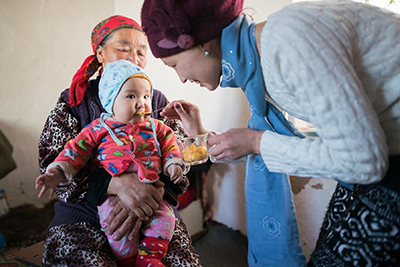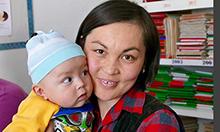Executive Summary

From 2014 to 2018, the SPRING project, funded by the U.S. Agency for International Development (USAID), worked in Jalalabad and Naryn oblasts, as well as Bishkek, the capital city of the Kyrgyz Republic. SPRING supported the Government of the Kyrgyz Republic’s maternal and child health improvement efforts, particularly to reduce stunting and anemia. According to the 2012 Demographic and Health Survey in the Kyrgyz Republic, 18 percent of children under the age of 5 are stunted and 43 percent are anemic; 35 percent of women ages 15–49 are anemic.
SPRING promoted the uptake of 11 evidence-based practices to improve the nutritional status of women and children in the 1,000 day window of opportunity from pregnancy to a child’s second birthday. Proper nutrition during this period is critical for children to grow up healthy and achieve their full potential. These practices span multiple sectors and progress requires working at various levels—at the national level, as well as in facilities and communities.
SPRING supported the revision of clinical guidelines and protocols for antenatal care and for the prevention and treatment of anemia and helminth infections. The project also enhanced the curriculum on nutrition in national medical education, ensuring students receive training on nutrition and anemia before they become doctors and nurses.
Since 2014, SPRING trained primary health care workers from 319 facilities in Jalalabad, Naryn, and Bishkek. These health workers provided more than 700,000 counseling sessions on nutrition and anemia. The project supported 20 facilities to achieve mother- and baby-friendly certification through the Baby-friendly Hospital Initiative.
To stimulate social change and improve nutrition practices in communities, SPRING mobilized over 3,200 community volunteers to deliver messages on family diet, maternal and infant health, and hygiene to approximately 40,000 households. To reach urban families, the project trained school teachers, health promotion units, and journalists, aired a series of videos on regional television and social media; and conducted urban campaign events to raise awareness and promote healthy nutrition and hygiene practices.
SPRING’s major focus of work in the Kyrgyz Republic has been to promote a diverse diet for all seasons, where access to fresh fruits and vegetables is limited during the cold winter months. The project produced both a guidebook on best practices for home-based food preservation and storage techniques, and a cookbook with recipes to increase dietary diversity and enhance age-appropriate feeding practices for children. SPRING also trained faculty from the Kyrgyz National Agrarian University and other nutrition and agriculture projects on how to link agriculture and nutrition.
The project’s 2017 endline survey revealed promising trends in behavior change in SPRING’s communities, including increases in iron–folic acid supplementation, exclusive breastfeeding, and dietary diversity for both women and children, as well as a decline in the consumption of sugary and processed foods—junk food—among children. SPRING’s work has shown how working across sectors, in partnership with communities—and through multiple communication channels—can bring about simple changes in behavior to ensure a healthy and diverse diet for families, laying the foundation for a healthy, productive, and prosperous Kyrgyz Republic.
To view the full text, please download the report above.
